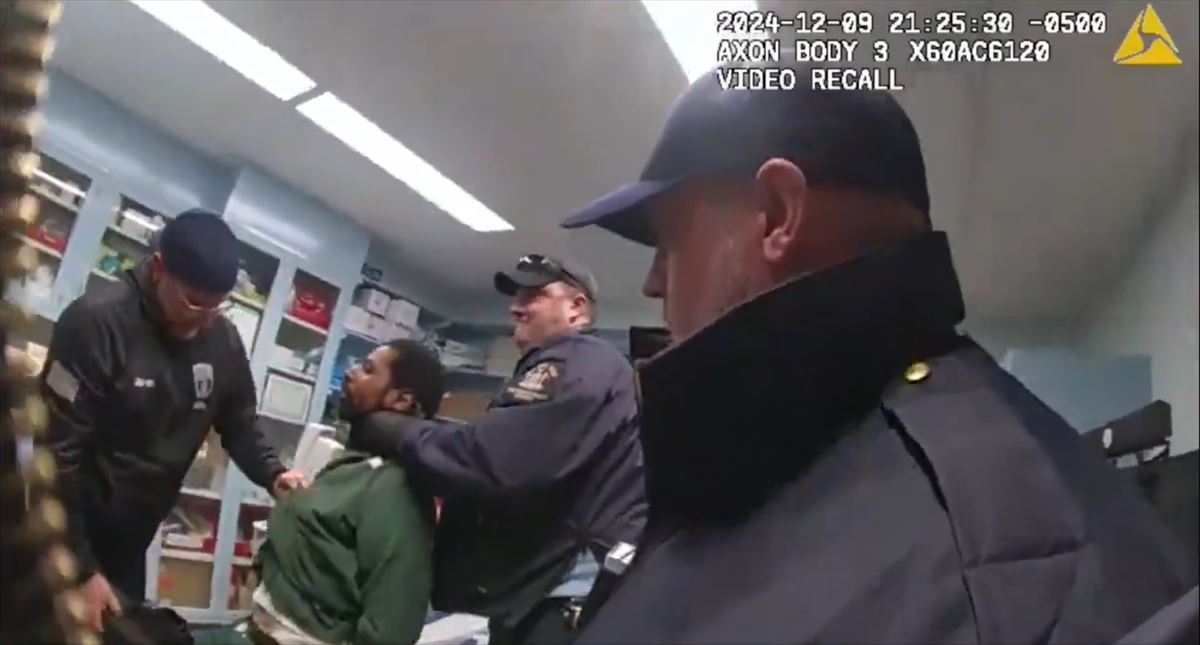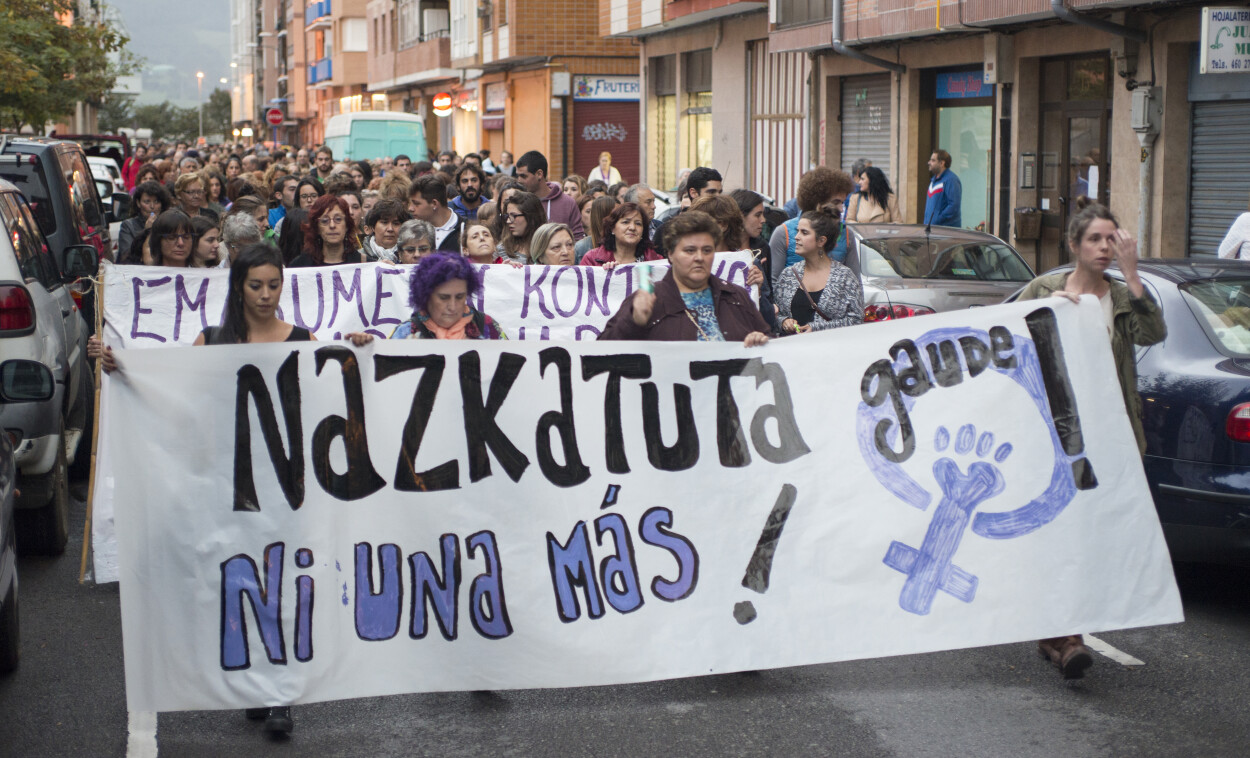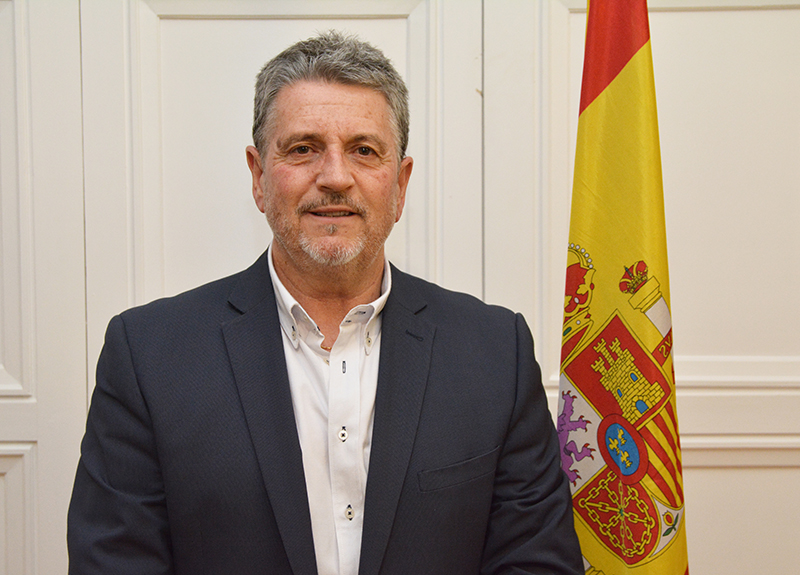Mattin Irigoien: Living Amikuze as if he were already Basque
- Mattin Irigoien (Ainhiza-Monjolose, 1964) works in a farmer training association established in Arberatz. Well-known writer and playwright, as part of the conference he offered in Bilbao in 2009, published “How we have kept our Basque”. He is a member of the leadership of the association Amikuzeko Zabalik.
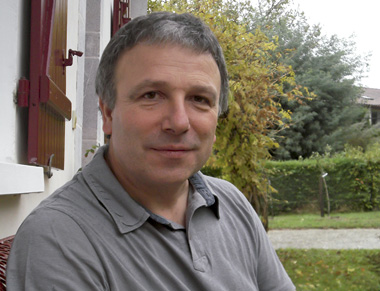
You have already told the story of the old man who, upon arriving at Amikuze in 1990, answered again and again in French from Garazi.
I have started in Basque, she has answered in French once, twice, the third… Since then, we have done so in Basque. But for me it was a mistake for people of a certain age to answer me in French. Since then I understood that those 20-30 year-olds had made their lives in French and that the old people had integrated it as normal.
I had left a world that lived in Euskera. In our town the whole crew were Euskaldunes, some also Abertzales, it was our world to sing, to sing, to sing… In Garazi we also saw it lost, but in Amikuze I realized that it had been 20 years longer. Like the acceleration of a movie.
Why?
It seems that the break-up of modernism has been much faster and more violent here. From a sociological point of view, most of the people of Amikuze were tenants, homeowners, as is often said in the case of the landlords. There could be one or two landowners in a town living in Donapaleu and dependent on all the labourers. Half of the non-total profits of the year had to report half of their turnover, half the price of the harvest or of the dispatches.
II. From the World War there are new rural laws forcing France to introduce agriculture into productivism, banks and tillage shops are created and a new farm law: the owner will not be paid half of the harvest, but a kind of premium per hectare. In this way the farmer can enter modernity, can take loans… All those people who until then lived in the mud come to build a new house, buy their lands, and thanks to their development people get into modernism, leaving behind the Basque.
They differentiate between maize and sheep.
Also in the field of sheep from Lower Navarre, that is, in the mountain area, modernity has entered, but not so strong. There is a certain Basque resistance, if you want passive resistance. That is where the ELB trade union has emerged and has been more vigorously maintained. Social relations have been maintained in Basque. Here, when people enter productivism, they get into a French system, they get full of dignity. It gives dignity to have land, to take credit, to enter the cooperative. And they go to French. They leave the old houses in the form of draughts or warehouses and build next to them the new houses in the form of a villa of 1960-1970, with zero isolation. They talk in French about robot water, electricity, refrigerator, shower, car, tractor.
You even mentioned shame.
That's more general, from all over the North, we all have in mind, because we've been colonized. That's why I see life as a decontamination process. We've put it in the head, that the Basque is an underlying thing. At the beginning of the twentieth century, it was “leit motiv” politics “the small Fatherland and the great Fatherland”. The Catholic Church itself was against the Republic in the late nineteenth and early twentieth centuries, but it has taken the leap for a moment, Hiriart-Urruty and all: “Now we are going to fight within the Republic.” There is the concept of small homeland and of great homeland.
They were both Basque and Franciscans. “Total schizophrenia,” we can say, but they had their coherence: the elites were French and the Basque became the instrument of the elite to control people. The Basque Country was a barrier to protect itself from the outside world. Sex, communism and… the city itself were the galleries of the city. This is how the motto “Euskaldun, fededun” is understood. To keep people clear, they also dirty the language, that's what we call the Basque cure.
The Basque of the priests?
The old man mentioned above, whom we trust, once told me that he did not have the beautiful “Basque of Hazparne”. In other words, the Basque of the priests: that of the missionaries, that of those who once a year came to the people to make people fear with hell and others. For example, Amikuzen spoke more than in Garazi the toka and noka, I guess this was also going to be linked to the condition of the landlords. But the Basque was like a priest who had to abandon, dirty, the defenders of the Basque country. It suggests a relationship between equals -- or because.
The Vasquism of the early twentieth century, in my opinion, is the control of the plain people, it is not “the people in favor of the Basque Country”, the diglosia is total. And I think that our Euskera movement is still contaminated by it. As we enter modernity, the diglosia has got into the head of each and “The great homeland and small homeland”, in other words, it is now within us very quickly. Although today these figures are similar to those of Gipuzkoa, Amikuzen barely
hears Euskera in the street… except on Friday morning at the Donapaleu fair.
Yes, but they are old men who have lived together since they were young. As soon as they get up to pay for coffee, they will do so in French. They know French very well and at home they speak French with the children.
However, knowing Euskera is something, but if you don't use a language you lose it. In life things are constantly changing, if it was important first the television had already arrived, then the Internet… If all the news comes in French, the Basque is left behind, to talk about an era and something else, say “Egun on” and then you speak the subject in French. Even in the most resilient areas, in mountain areas, it is clearly visible.
"Every time I don't speak Basque he dies and if the Basque has to live, he has to live today. Twenty years from now, we won't make a male."
The Abertzale movement has not succeeded in overcoming that, we have heard it.
The Abertzale movement is a double assault. On the one hand, against that Basque elite of the early twentieth century and no longer uses the word “vascophilous”. It is also an aggression because modernism has broken old balances. Then he assumes this revolutionary discourse, that of the left, May 1968, the decolonization of the Third World… but where does it feed? Not the Basque, all the French, all the political magazines, all the concepts, are thought of in French. A liberating movement, in favor of the Basque country, fed from French.
Then, what you see, in the movement of the Ikastolas, in the Night Schools… there are people who put the Basque country in the centrality. But they're an intrauterine minority. The newspaper only goes a little further in writing. The liberating movement in Euskera is not growing.
Because you mentioned the ikastola… How has the confluence between the unified Basque and the old Basque in the area passed through here?
The ikastola has arrived in Hegoalde and pedagogical material is needed, so a collected material is used. In Amikuzen, I realized that there was a gap between that and Euskera. At the time of distraction, the young people knew not one of Amikuze's old songs sung by their parents and moms, nor a story of the landlords here, even if it was their families. Libertism was the reappropriation of its geography to young people, the recovery of their social history. Ikastola did not allow such transmission.
Is it a very rich place today?
During the rest time the Basque Country was prohibited in school. The force of prohibition has weakened as nationalism is strengthened. In the sheepmeat sector, in the regions where Euskera has lasted the longest, today it seems that it is accepted that bilingualism is the best. If the entry data of the school [enrollment] are displayed, the parents choose the Basque or the Basque for their children. Here, in Amikuze, Euskera is a thing of the past for many people, the local elite believes it this way. But here too, parents choose Euskera when they have the opportunity. There's a fence that's not dead.
The French State is not the little one who sleeps, but accepts from time to time some contributions. As a school that met the ikastolas, then came the Basque Institute of Culture, then Euskal Herria 2010 with their elected councils and development councils, to integrate a think-tank with the ideas of the abertzales and also with the Abertzale people… There were some projections, some degrees of recognition, and since then, what do we see? Bilingualism, professionalism and heritage are things that are valued in culture. Language becomes patrimony.
This is the place that France recognizes a province, an underlying culture, it is French that allows people here to “liberté”, “égalité” and “fraternité”, it is the language in which people pass, “cytoyen”. Professionalism is delegation and looking at the market, because the market is in French, the Basque will be there in a sound. The situation of diglosia is Ele-bi, after all it becomes in favor of the French, which means not proposing the option of working in Basque wherever possible.
You have critiqued that our generation has resigned from Euskera.
I do not criticize it, I try to understand it, assuming that some paths can be opened from understanding; I believe that the support of our Basque country remains in a pose. That use is not an end. That we get educated in euphemisms. If we want the Basque language to be the language of everyday life also in the future, the language of affection and the social language, we do not comply with the minimum to go to the subject. One, the objective is no longer mentioned. Two, we're in euphemisms. Three, we are at a very low level of demand. With respect to others, always the official or the co-ordinality, but above the icing in the very humble, very comfortable demand.
The Basque country has presence in the protest, it also has this fighting force, it marks a radicality, but then all this is lived in French. It is a question that we who are in favour of the Basque country do not think enough about the objective… if tomorrow the language will live, today all children must know that it is necessary. Not that half of the children are schooled in model B and D: that everyone has to learn. The choice arises in a specific language. If I cannot speak in Basque for being monolingual French, then I have no choice, neither I nor the monolingual French.
There is talk of cooficiality and it can be said that the solution must be within it. But France is not going to leave cooficiality, as Spain is not going to leave independence to Catalonia if it does not go through unilaterality… But we ask for cooficiality and we are going to eat pintxos in French. We submit to ourselves.
Here we delegate the use of Euskera for tomorrow, the children of tomorrow will, the ikastola will do it, the strength of Hegoalde will do it for us, you can also dream… Today we cannot: tomorrow. There is an elite patriot who has said that he can recover his language even if he loses; if we still do so in French to convince those who do not know Euskera. Will the Basque be necessary for the convinced in French? I say the opposite: every time I do not speak in Basque, the Basque dies, and if the Basque country has to live today it has to live. We need spaces that compel the community so that the tongue has enough density to revitalize it. Diluting the language requirement serves to clear the language. In twenty years' time, language will not be used to travel in life, perhaps for tourism. Israel is the one who is again acquiring a language from scratch, as I know, and see how.
On the other hand, we have only one life, and I can’t believe in slogans like “tomorrow we’ll win.” Let us live today what we want for tomorrow. That's the most ecological, the most feminist and the most alternative: if you don't live today, the struggle has been lost, because today we live. What are our pleasures, our treats? When the creation classes of the newspaper or bertsos begin, in Iparralde the young people settle in the bars in Basque… those are our vows. Or create, feel, work a theater in a group of young people. There we see that there is a community in Basque. Because the Internet is also there, I will feel closer to an author who is working on the ARGIA website than what is being talked about here in French Basque.
And what are the Amikuzen Zabalik people doing?
The work of the last ten years has been to create the association of Euskera and to bring together the people of the Basque world. Living atomized falls into despair and the levels of demand are reduced, it is normal that you are only against a wall and the walls are always increasing. The first work that has been done has been to promote and unite the groups that want to live in Basque.
Let us mention Libertism.
Making libertinage achieves several goals. On the one hand, eight or ten people of one generation intersect in the theater, and in total more than 30 young people have participated in the Kitzikazank group. There, a space has been created that only works in Euskera, “Euskera and Euskera”. Just as Maialen Lujanbio summed up our philosophy in three words, that is our vital objective. Because “of the Basque Country” adds that, in addition to transmission, there is a world that we have to live with our goal, with nature, with objectives. Every generation needs male-create Euskera, that lab is also Libertiment.
Then, the world of emotions, an experience in Basque that is not possible anywhere else. In ikastola it was possible, but ikastola is for a percentage of young people of life… a quarter? Television occupies the rest, sports, etc. Libertinage is the compaction of a generation. And then take the square. It is no small thing that when the Basque Country has disappeared from the plaza some time ago, it is done in Donapaleu that thinks that under these conditions the Basque Country was finite, eliminating and repressing complexes. We do not ask whether we have to make a translation. Make Amikuze a day as if he were already Basque. With our shortcomings, the dance group with us speaks French, OK, we do so in the context in which we have everything we can.
It's also bringing together an audience, creating a community and talking to it. People have arrived, they'll be there all morning, they'll laugh peacefully, they're not in a room, they're in the dark. We eliminate visibility and create action. It is not a spectacle like today it is done so much in the Basque culture, but it is an event that arises here, in the community, from the Basque and from the Basque.
Although it is also the appropriation of heritage, in Amikuze we include lost songs, forms of provocation, membrane molds, toka and noka, although with great difficulty, laughing at our complex conditions… a catharsis is sought.
At Amikuze you try to organize the Basque community, bringing together your associations Zabalik, Ikastola, AEK, Gaztetxe… Does it work?
For starters, we got minimal visibility from people, because it wasn't before. Then, we have a place to talk about this issue, when language is in the middle. When a person or a group has an idea, there's a place where we can try and think about how to do it strategically to do it. If libertinage emerges, now. We also have the Bertso Eskola, there are few things, but before it wasn't, it was always one more step.
Now a group of fathers and mothers has come to us saying that a free time centre must be set up in Basque. That's one of the dreams of our beginnings. That is what is needed. Everything is possible if the community is compacted, when it is not compacted it is not possible, because the language is not the center.
However, if we started twenty or forty years ago, when the people were Euskaldun... When we were in the theater in 1985, there was a Basque community, eight out of ten in our population. We thought it was possible but we have arrived here and now eight out of ten is in French. The feeling is that something we have failed there, a qualitative leap.
You have also organised a TELP. In Hegoalde he is also very pioneering: How did it happen here? Isn't it a boost?
That was one more step. Inertia supposes a strengthening of the dyglosia in the Basque movement and the TELP is a clash on this point. If people come to propose the use of Euskera and how the relations between languages are, “it is my responsibility to live in Euskera, I speak in French with those who know in Euskera more than I think”… taking that awareness is not too advanced. It is too advanced if we think “ui, we have to pay attention to it, because those who do not know Euskera may feel raped…”. Here the Basque is the one who has got the most into these fears.
What is the TELP too advanced here? In any case, you can see a decalage between that and society here, because at first we are or we are not many people. But what else can you do about language? Do we have to leave everything else if that means the loss of language? Responding like bertsolari, if this is too advanced, the other roads are too late. That debate is also in your day ...
In Hegoalde we have burned many stages of bilingualism to reach actions and approaches such as the TELP.
The difference is that your young generations are Euskaldunes with knowledge. If you have a social mass, young people can think “if I don’t do it, I will never do it” and there it has come very well. It is different for us to raise these things here when there are no Basques or very little. You might think that force is a waste, or I don't know what. But here too, not doing what we do -- it's living in French.
I am not going to be imposing Basque on the French. But those who know Basque have abandoned it, because by inertia they speak French among them, to win it. We have to start from where we are, that will be the first step. If we live by chance for another forty years, perhaps those who do not know Euskera will learn…
That's creating a social change, first in everyone's head, and then that appears collectively, that lives. It is up to us to warm up the environment, and that is the objective of an association, of an association of Euskera. And to taste, without suffering, we are not here in Jansenism. On the contrary, it is a very positive and valuable life experience.
FERMIN MUGURUZA 40. ANNIVERSARY
When: 21 December.
Where: Bilbao in the Arena.
-------------------------------------------
Every year Bilbao will be on the 21st of December. The cider and talo, protagonists of the day, is the day of the fair of St. Thomas. This year,... [+]
Goldatz talde feministak antolatua, ortziralean, urtarrilaren 3an, Jantzari dokumentala proiektatuko dute Beralandetan (17:30ean) eta biharamunean, urtarrilaren 4an, Berako bestetako tradizioak aztergai izanen dituzte Maggie Bullen antropologoarekin leku berean (10:30).







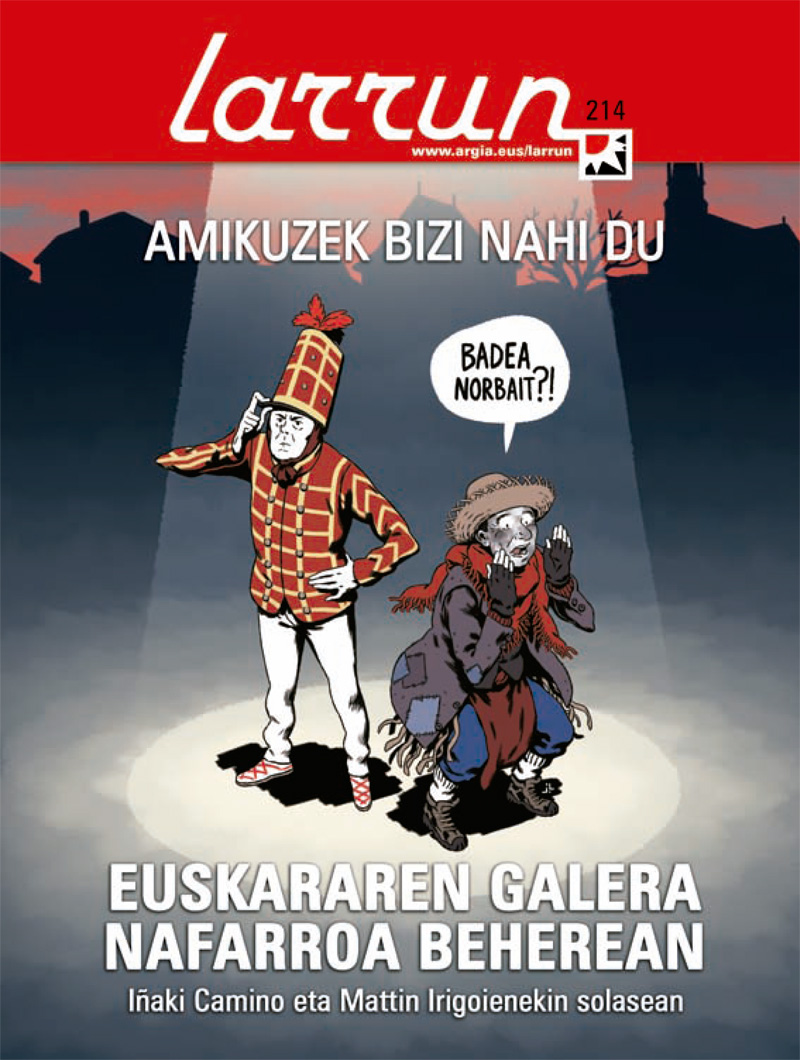

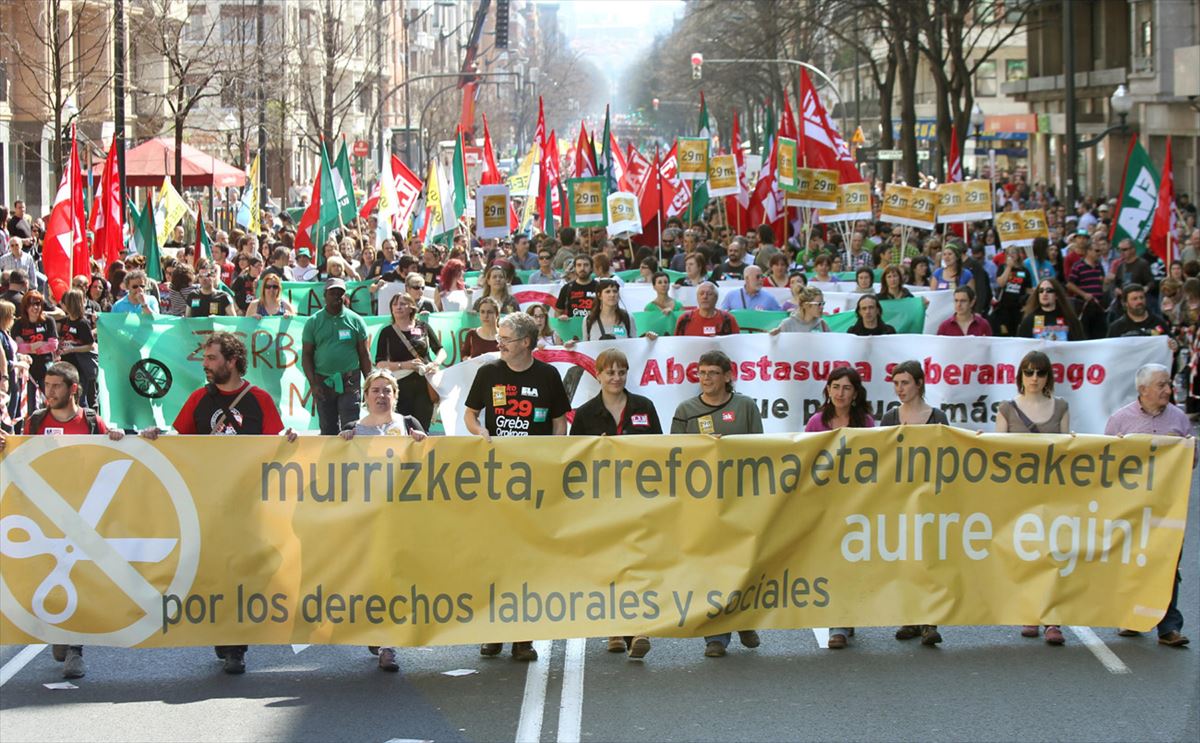
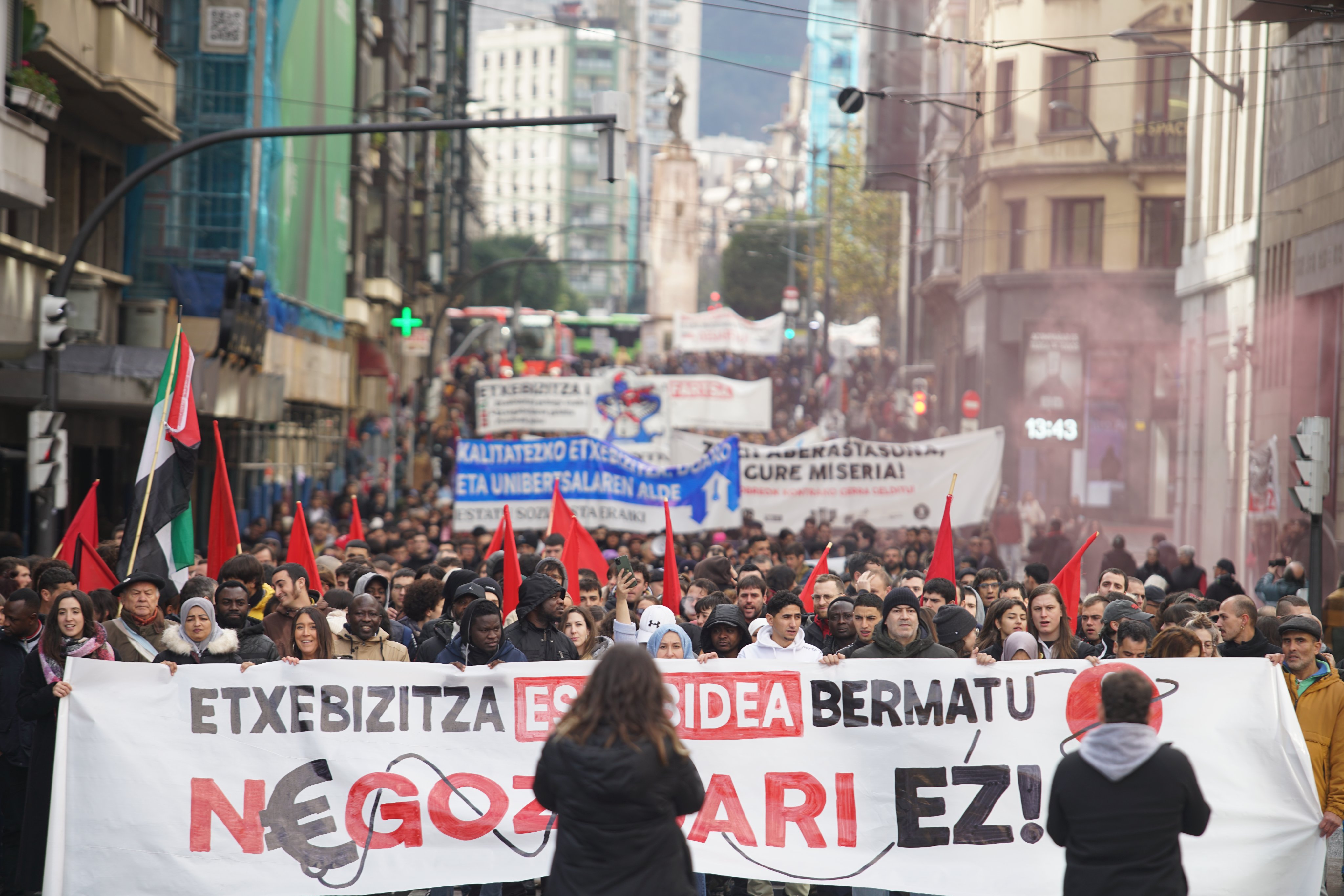



.jpg)
